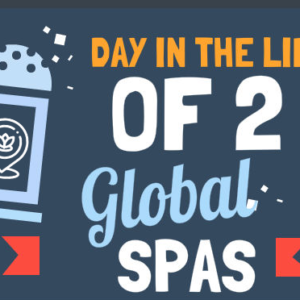5 Tips for Painfully Shy Spa Therapists

Most therapists who work in the spa industry are introverts. It doesn’t matter if they are in Bangkok, Thailand or the United States, they tend to be shy. It makes sense; what other personality type would elect to work in a darkened room, one on one with a minimal need for conversation. But even introverts want to be part of the group. Here, Jeff Hayden gives 5 tips on how to fit in.
We all want to stand out in some way… but we also want to fit in and feel confident: to feel we belong, to feel we’re part of a community, or to feel we’re part of something larger than ourselves.
But if you’re like me fitting in is not so easy. For one thing I’m shy. Unless I’m onstage at a speaking engagement, I’m fairly introverted. (If you know anything about introverts you know we can turn it on when we need to.)
And I’m hardly brimming with natural self-confidence unless I’m in the right settings; like many people my self-confidence is largely situational.
That’s too bad. Feeling confident and like we belong helps make us more relaxed, more motivated, and more self-assured. We not only better about ourselves, we also perform better. And we’re more willing to help others.
Fitting in when we want to = equals win, win, win.
So how can you fit in when you don’t feel you belong — whether at your job, in a group, or just within an informal collection of people?
1. Start quietly and just do the work.
We’ve all been in situations where “that person” shows up for the first time and tries immediately to force his or her way into a group.
Don’t be that person.
Say you join an industry organization. Show up for every meeting. Contribute in small ways, but otherwise lay low. Show you know you’re new. Show you don’t expect to be taken seriously until you prove you’re serious — and that you’re in it for the long haul.
2. Volunteer for the worst jobs.
That person tries to leapfrog his or her way to the plum tasks. Sometimes that person even manages to pull it off, but the cost, in terms of belonging, is high.
Instead use the time you’re laying low to figure out where you can make the biggest difference to the people in the group.
The easiest way is to find ways to make other peoples’ lives easier. Volunteer for the grunt work. Volunteer for the glory-free tasks.
Volunteer to pay your dues.
3. Ask for help that only requires words.
That person goes to a networking event and, moments after meeting you, wants an introduction to someone you know, for you to wrangle them an appointment with one of your customers, wants you to — well, you know how it goes. We all need help. We all need assistance. But once you’ve paid some dues, be smart and start small.
Don’t ask for time or effort.
Just ask a question.
One, you’ll get the information you need. Two, you’ll implicitly show you respect the person you asked. (Aren’t you always flattered when someone asks you for advice?) And best of all, that little exchange will help you start making real connections.
Never go for the networking or assistance jugular. Wait until you fit in.
Then people will offer to help you.
4. Find ways to help in ways that require more than words.
That person immediately walks over and tells you what you’re doing wrong. Or what you could be doing better. Or what you should be doing differently.
Or, most likely, what you should be doing his or her way.
That kind of help is more about that person than about you — much less about what you might actually need.
Pay attention so you’ll notice when others are struggling. Then come up with specific ways to help so you can push past the automatic “No, I’m OK,” response.
Very few people offer help before they have been asked, even though most of the time that is when a little help makes the greatest impact. Just make sure you offer to roll up your sleeves and actually help — that’s the only way to make a real difference in another person’s life.
5. Make an effort to help other people feel they belong.
No matter how welcoming and new-employee-friendly a company, recently hired employees may feel they’re constantly being weighed… and measured… and found wanting.
Maybe it’s the guy in shipping who always eats lunch alone. Maybe it’s the lady in accounting who always stands at the edge of a group. It’s easy to spot the people who feel hesitant and out of place.
Just pick one. Say hello. Say something nice. Say, or do, something that makes the person feel a slightly bigger connection — to the company, to a group, or just to you.
Reach the point at which you feel confident helping others fit in and that’s when you truly fit in… because then it’s no longer about you: it’s about the group and the people in that group.
Which, when you think about it, is the perfect definition of fitting in.






